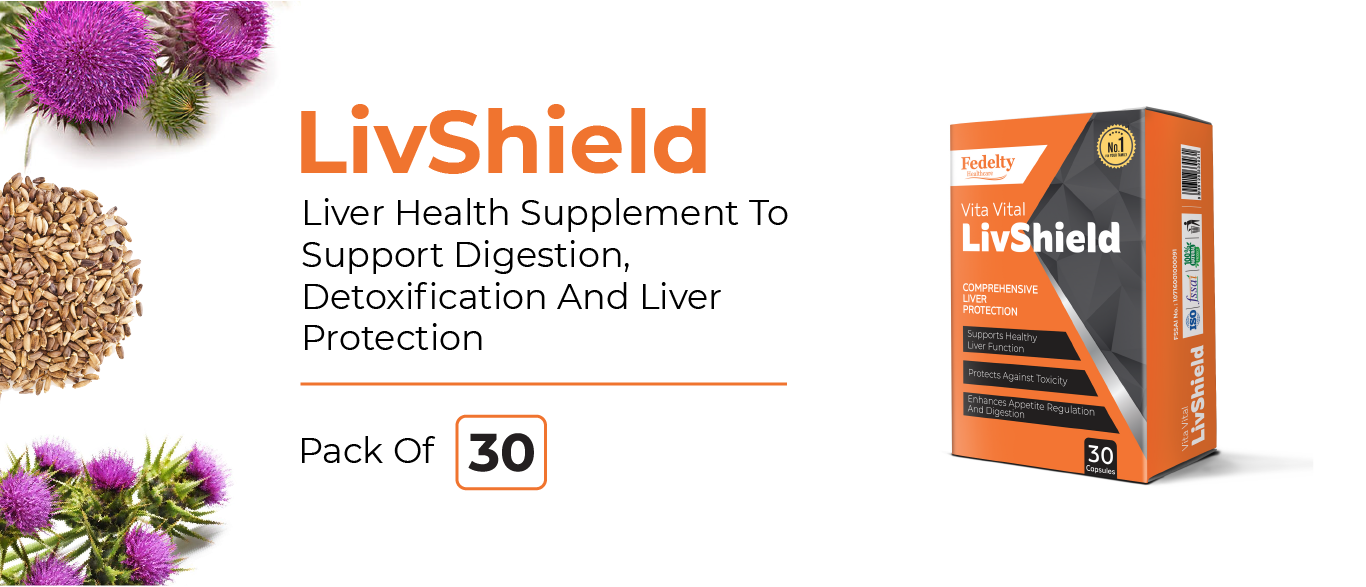

Improves Aminotransferases And Other Liver Function Parameters
Prevents Lipoperoxidation And Cellular Membrane Damage
Enhances Hepatic Glutathione Levels
Increases Protein Synthesis In Hepatocytes By Stimulating RNA Polymerase I Activity
Improves Gastrointestinal Functionalit And Boosts Nutrient Absorption
Silybum marianum, better known to the world as milk thistle, is undoubtedly the best known herb when it comes to liver disease management. The herb has a long history of use in traditional medicine and has been rigorously studied as a potential natural liver disease treatment. The lipophilic extract from the plant’s seed is most active containing three isomer flavonolignans - namely silybin, silydianin, and silychristin. Together, they are referred to as silymarin. Silybin demonstrates the greatest biological activity and comprises about 70 percent of silymarin. Silymarin is highly valued as a therapeutic agent because it works as an antioxidant, inhibiting the action of free radicals and lipid peroxidation.
Studies have found that silymarin exhibits antifibrotic activity and may also protect the liver from toxins by limiting or preventing them from binding with hepatocyte cell membrane receptors. In animal studies, the extract has shielded against liver damage that can be induced by toxins such as acetaminophen, phenylhydrazine, alcohol, radiation, and iron overload. Silymarin is therefore used as a natural treatment for alcoholic or toxin-induced liver disease, as well as acute and chronic viral hepatitis. In addition to its liver supportive, hepatoprotective, antioxidant and anti-inflammatory properties, silibinin has been found to be promising as a potential aid for liver cancer treatment in in vitro and in vivo studies.
Phyllanthus Amarus, Picrorhiza Kurroa and Curcuma Longa are the other primary ingredients in Livshield and they offer similar benefits although mechanisms of action may differ. Although these herbs are not as widely recognized for their hepatoprotective benefits as compared to Silybum marianum, they are just as important.
Traditionally, Phyllanthus amarus has been used to promote liver health, especially in the management of jaundice and viral hepatitis. The herb has proven hepatoprotective properties and may also shield the liver through anti-inflammatory effects. It has been shown to downregulate specific inflammatory signaling mediators. Additionally, the herb has demonstrated potential antidiabetic, antihypertensive, analgesic, and antimicrobial properties.
Picrorhiza Kurroa is another herb that is not widely known for its liver health benefits, but it may be effective as or more effective than Silybum marianum. It has strong liver protective and immunomodulatory properties that can help promote healthy liver function and protect against liver disease. These hepatoprotective features are linked to kutkin molecules in the herb and can even protect against toxin exposure whether administered before or after the exposure. In one study, a low dose of kutkin was also found to be effective in the treatment of viral hepatitis.
Curcuma Longa or turmeric is highly valued for its varied therapeutic applications. As with almost all curcuma longa benefits, its hepatoprotective effects are also linked to the main bioactive compound - curcumin. Studies suggest that it can prevent fatty acid accumulation in the hepatocytes through a hypolipidic effect. This feature could help in the prevention of nonalcoholic fatty liver disease. The herb can also promote liver health and protection through its better-known antioxidant activity, which affects various cellular processes and restricts age related degeneration.
Bhringraj is best known as an Ayurvedic herbal ingredient in hair oils, while Piper Nigrum is simply regarded as a flavorful spice. However, both ingredients are known to exhibit therapeutic effects, including anti-inflammatory, antimicrobial, antioxidant, and digestive stimulant activity. Some studies have shown that bhringraj can enhance liver protection, reducing liver damage caused by exposure to toxic chemicals or alcohol. Additionally, the herb has been found to help control blood sugar levels and reduces oxidative stress.
Aside from the fact that Piper Nigrum also works as a potent antioxidant in the body, it has a beneficial impact on digestion and appetite. This is because the ingredient stimulates pancreatic and intestinal enzyme production to aid the digestion of fats and carbohydrates. Additionally, consumption of piper nigrum facilitates the absorption of certain nutrients and healthy bioactive compounds like curcumin.
Dosage
1 Capsule a day with your main meal.
Storage Condition:
Store in cool dry place at temperature not more than 30°C
Caution
What’s Inside
